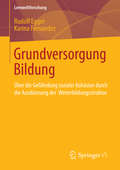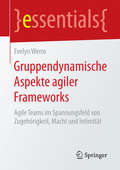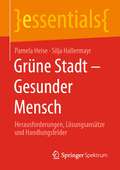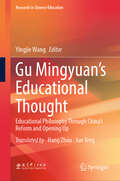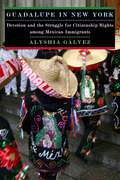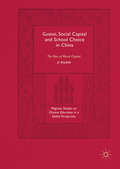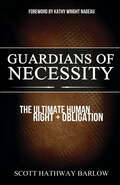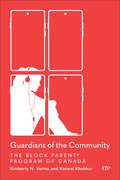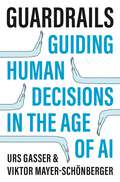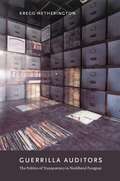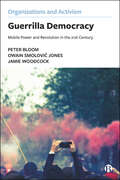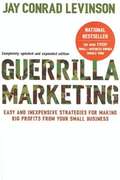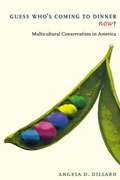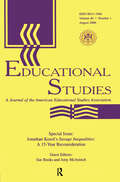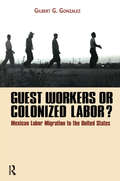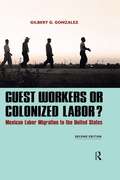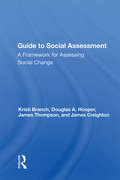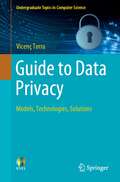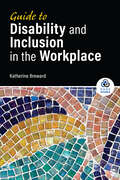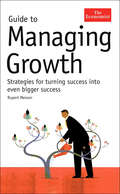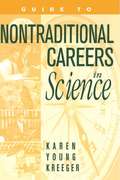- Table View
- List View
Grundversorgung Bildung
by Rudolf Egger Karina FernandezDemographische Veränderungen und geographische Wanderungsbewegungen führen zu zahlreichen sozialen und lebensweltlichen Spannungen zwischen städtischen Zentren und ländlichen Gebieten. Die Folgen dieses Wandels sind in zahlreichen peripheren Regionen bereits deutlich zu spüren. In diesem Buch werden die Effekte von Abwanderungsprozessen und Gegensteuerungsmaßnahmen durch Bildung anhand eines Modellfalls beschrieben. Dabei werden die Gestaltungskräfte von Weiterbildung für Prozesse der Regionalentwicklung, der Schaffung sozial-regionaler Ankerpunkte und der Daseinsvorsorge für Menschen analysiert.
Gruppendynamische Aspekte agiler Frameworks: Agile Teams im Spannungsfeld von Zugehörigkeit, Macht und Intimität (essentials)
by Evelyn WerroEvelyn Werro zeigt in diesem essential, wie mit einem neuen agilen Organisationsparadigma und Scrum als einem der agilen Frameworks versucht wird, der durch die neuen Technologien getriebenen, wachsenden Komplexit#65533;t im wirtschaftlichen Kontext zu begegnen. Dabei erl#65533;utert sie, dass Teams als eine spezifische Auspr#65533;gung einer Gruppe in diesem Prozess eine oft untersch#65533;tzte, aber entscheidende Rolle spielen. Die Autorin stellt Fragen wie: Inwiefern spielen dabei gruppendynamische Erkenntnisse eine Rolle? Wie erfolgreich kann Scrum sein, wenn den impliziten gruppendynamischen Aspekten explizit keine Beachtung geschenkt wird? Und was bedeutet dies f#65533;r die Arbeitsf#65533;higkeit von Teams?
Grüne Stadt - Gesunder Mensch: Herausforderungen, Lösungsansätze und Handlungsfelder (essentials)
by Pamela Heise Silja HallermayrDas Leben in der Stadt kann zu physischen und psychischen Erkrankungen führen. Dabei spielen Umweltfaktoren, wie z.B. Extremwetterereignisse, Luftverunreinigung, Lärmbelastung oder veränderte Stadtklimatologie durch Versiegelung eine entscheidende Rolle.Ein grünes Stadtbild kann durch die Schaffung gesundheits- und bewegungsfördernder Strukturen die Gesundheit und das Wohlbefinden der Bürger positiv beeinflussen und damit Krankheiten, die durch das Stadtleben begünstigt werden, abmildern.
Gu Mingyuan’s Educational Thought: Educational Philosophy Through China’s Reform and Opening Up (Research in Chinese Education)
by Yingjie WangThis book systematically reviews the educational thought of Mr. Gu Mingyuan, one of the most prestigious educationists in contemporary China, and details the development of his pioneering educational ideas. The content covers virtually all areas of education, from pre-school to higher education and lifelong learning, from general education to vocational education and informal learning. In the process, it comprehensively reflects Mr. Gu’s insights on global education and his perspectives on Chinese education, reviews China’s educational history, assesses the status quo, and outlines the future of education. Since he has not only been a significant witness but also a key promoter of all major educational changes since China’s reform and opening up over the past 40 years, this book is more than a personal biography of a Chinese educationist; rather, it epitomizes the evolution of China’s educational thinking over the past four decades.
Guadalupe in New York: Devotion and the Struggle for Citizenship Rights among Mexican Immigrants
by Alyshia GalvezEvery December 12th, thousands of Mexican immigrants gather for the mass at New York City’s St. Patrick’s Cathedral in honor of Our Lady of Guadalupe’s feast day. They kiss images of the Virgin, wait for a bishop’s blessing—and they also carry signs asking for immigration reform, much like political protestors. It is this juxtaposition of religion and politics that Alyshia Gálvez investigates in Guadalupe in New York.The Virgin of Guadalupe is a profound symbol for Mexican and Mexican-American Catholics and the patron saint of their country. Her name has been invoked in war and in peace, and her image has been painted on walls, printed on T-shirts, and worshipped at countless shrines. For undocumented Mexicans in New York, Guadalupe continues to be a powerful presence as they struggle to gain citizenship in a new country.Through rich ethnographic research that illuminates Catholicism as practiced by Mexicans in New York, Gálvez shows that it is through Guadalupan devotion that many undocumented immigrants are finding the will and vocabulary to demand rights, immigration reform, and respect. She also reveals how such devotion supports and emboldens immigrants in their struggle to provide for their families and create their lives in the city with dignity.
Guanxi, Social Capital and School Choice in China: The Rise of Ritual Capital (Palgrave Studies on Chinese Education in a Global Perspective)
by Ji RuanThis book focuses on the use of guanxi (Chinese personal connections) in everyday urban life: in particular, how and why people develop different types of social capital in their guanxi networks and the role of guanxi in school choice. Guanxi takes on a special significance in Chinese societies, and is widely-discussed and intensely-studied phenomenon today. In recent years in China, the phenomenon of parents using guanxi to acquire school places for their children has been frequently reported by the media, against the background of the Chinese Communist Party’s crackdown on corruption. From a sociological perspective, this book reveals how and why parents manage to do so. Ritual capital refers to an individual's ability to use ritual to benefit and gain resources from guanxi.
Guardians of Necessity: The Ultimate Human Right and Obligation
by Scott Hathway BarlowYou are alone and finishing up some shopping at the local mall when you hear a young woman scream for help. You notice that she’s surrounded by several men. Your mind begins the justification process: she is just playing; someone else will come to her aid. As you hesitate, the young woman is dragged into a van and they disappear. Already late for a meeting, as you power walk toward your office you see a young boy crying and being dragged to a car. Your mind begins the justification process: the child is just being petulant; if it is really an issue, others will jump in to help the child. You hesitate and the boy is forced into the car, and they disappear. You just arrive home from work exhausted and ready for supper. You see your elderly next-door neighbor, who lives alone, being verbally belittled by a worker he hired to do some type of chore. Your mind begins the justification process: it’s a dispute between them; I don’t know my neighbor well enough to intervene. In each of these cases, would you be surprised to learn that the young woman was abducted and murdered, the young boy is still missing, and the elderly neighbor was just scammed of a significant portion of his life savings? Most of us think we are not capable of rendering aid. If we do, we reason, we could be hurt, sued, or embarrassed because we misinterpreted the situation. Guardians of Necessity recognizes the right of all humans to defend themselves and others against an attack. This right is in reality an obligation that carries an awesome responsibility. Within these pages the reader is taken through the history of this right, the legal and political climate surrounding this right, and the importance of preparing to exercise this ultimate right.
Guardians of the Community: The Block Parent® Program of Canada
by Kim Varma Kanwal KhokharThe Block Parent® Program of Canada was launched in 1968 following a tragic child abduction and homicide in Ontario. It rapidly expanded across the country, becoming the largest volunteer-led child safety initiative. For over fifty years, the program relied on volunteer homemakers, mostly stay-at-home mothers, who signaled their homes as safe havens for distressed children. Supported by partnerships with police, local businesses, and schools, the program provided a community-based approach to child protection. Although participation declined over the years, recent concerns about bullying, traffic safety, and child protection have sparked renewed interest in Block Parent communities. Guardians of the Community examines the social, political, technological, and cultural conditions that shifted along with the program to understand the landscape of child protection and community crime prevention over the last five decades. The book draws upon open-ended interviews with key figures who were instrumental in launching and leading the Block Parent Program, analyses of annual reports and documents from the program, and public sources including newspapers, social media, and Hansard debates to explore public and political perceptions of the program and related safety concerns. In exploring the motivations underlying involvement in child safety programs, Guardians of the Community reveals the connections between community engagement and cohesion, civic responsibility, and concerns around child protection.
Guardrails: Guiding Human Decisions in the Age of AI
by Viktor Mayer-Schönberger Urs GasserHow society can shape individual actions in times of uncertaintyWhen we make decisions, our thinking is informed by societal norms, &“guardrails&” that guide our decisions, like the laws and rules that govern us. But what are good guardrails in today&’s world of overwhelming information flows and increasingly powerful technologies, such as artificial intelligence? Based on the latest insights from the cognitive sciences, economics, and public policy, Guardrails offers a novel approach to shaping decisions by embracing human agency in its social context.In this visionary book, Urs Gasser and Viktor Mayer-Schönberger show how the quick embrace of technological solutions can lead to results we don&’t always want, and they explain how society itself can provide guardrails more suited to the digital age, ones that empower individual choice while accounting for the social good, encourage flexibility in the face of changing circumstances, and ultimately help us to make better decisions as we tackle the most daunting problems of our times, such as global injustice and climate change.Whether we change jobs, buy a house, or quit smoking, thousands of decisions large and small shape our daily lives. Decisions drive our economies, seal the fate of democracies, create war or peace, and affect the well-being of our planet. Guardrails challenges the notion that technology should step in where our own decision making fails, laying out a surprisingly human-centered set of principles that can create new spaces for better decisions and a more innovative and prosperous society.
Guerrilla Auditors: The Politics of Transparency in Neoliberal Paraguay
by Kregg HetheringtonGuerrilla Auditors is an ethnographic account of the rise of information, transparency, and good governance in the post-Cold War era, and the effects of these concepts on Paraguay's transition to democracy. Kregg Hetherington shows that the ideal of transparent information, meant to depoliticize bureaucratic procedures, has become a battleground for a new kind of politics centered on legal interpretation and the manipulation of official documents. In late-twentieth-century Paraguay, peasant land politics moved unexpectedly from the roads and fields into the documentary recesses of state bureaucracy. When peasants, bureaucrats, and development experts encountered one another in state archives, conflicts ensued about how bureaucracy ought to function, what documents are for, and who gets to narrate the past and the future of the nation. Hetherington argues that Paraguay's neoliberal democracy is predicated, at least in part, on an exclusionary distinction between model citizens and peasants. Despite this, peasant activists have found ways to circumvent their exclusion and in so doing question the conceptual foundations of international development orthodoxy.
Guerrilla Democracy: Mobile Power and Revolution in the 21st Century (Organizations and Activism)
by Peter Bloom Owain Smolović JonesThe liberating promise of big data and social media to create more responsive democracies and workplaces is overshadowed by a nightmare of election meddling, privacy invasion, fake news and an exploitative gig economy. Yet, while regressive forces spread disinformation and hate, 'guerrilla democrats' continue to foster hope and connection through digital technologies. This book offers an in-depth analysis of platform-based radical movements, from the online coalitions of voters and activists to the Deliveroo and Uber strikes. Combining cutting edge theories with empirical research, it makes an invaluable contribution to the emerging literature on the relationship between technology and society.
Guerrilla Marketing (Fourth Edition)
by Jay Conrad LevinsonWhen Guerrilla Marketing was first published in 1983, Jay Levinson revolutionized marketing strategies for the small-business owner with his take-no-prisoners approach to finding clients. Based on hundreds of solid ideas that really work, Levinson’s philosophy has given birth to a new way of learning about market share and how to gain it. In this completely updated and expanded fourth edition, Levinson offers a new arsenal of weaponry for small-business success including* strategies for marketing on the Internet (explaining when and precisely how to use it)* tips for using new technology, such as podcasting and automated marketing * programs for targeting prospects and cultivating repeat and referral business* management lessons in the age of telecommuting and freelance employeesGuerrilla Marketing is the entrepreneur’s marketing bible -- and the book every small-business owner should have on his or her shelf.
Guest Editor'S Introduction Es V40#1: J.KOZOL'S SAVAGE INEQUALAIT.
by Sue Books Amy McAninchFirst published in 2006. Routledge is an imprint of Taylor & Francis, an informa company.
Guest Workers or Colonized Labor?: Mexican Labor Migration To The United States
by GilbertG. GonzalezWhile a few commentators have recognized the parallels of the guest worker programs for Mexican immigrants to the United States to the bracero policies early in the 20th century, fewer still connect those policies to traditional forms of colonial labor exploitation such as that practiced respectively by the British and French colonial regimes in In
Guest Workers or Colonized Labor?: Mexican Labor Migration to the United States
by Gilbert G. GonzalezA decade of political infighting over comprehensive immigration reform appears at an end, after the 2012 election motivated the Republican Party to work with the Democratic Party's immigration reform agendas. However, a guest worker program within current reform proposals is generally overlooked by the public and by activist organizations. Also overlooked is significant corporate lobbying that affects legislation. This updated edition critically examines the new guest worker program included in the White House and Congressional bipartisan committee s immigration reform blueprints and puts the debate into historical and contemporary contexts. It describes how the influential U.S. Chamber of Commerce and the AFL-CIO agreed on guidelines for a new guest worker program to be included in the plan. Gonzalez shows how guest worker programs stand within a history of utilizing controlled, cheap, disposable labor with lofty projections rarely upheld. For courses in a wide variety of disciplines, this timely text taps into trends toward teaching immigration politics and policy.Features of the New Edition"
Guia Para Usuário De Fitas De Teste De Cetose
by Katherine AaronGuia rápido e fácil de como usar as fitas de teste para medir corretamente os níveis de cetona na urina, no sangue, e entrar em cetose mais rapidamente.
Guida All'uso Delle Strisce Di Chetosi
by Katherine AaronLa Guida completa su come misurare i livelli di chetoni nelle urine, nel sangue e come entrare più velocemente nella chetosi! Non siete troppo sicuri di essere in chetosi? Ma avete affaticamento, sete, influenza e boccaccia? Avete fatto una dieta chetogena per alcuni giorni! Siete alla ricerca di una guida completa su come usare le strisce reattive per la chetosi e su come entrare più velocemente nella chetosi entro 48 ore? Se questo è ciò che state sperimentando, continuate a leggere! Le strisce reattive per chetogeni o le strisce reattive per chetoni sono foglietti distintivi tagliati sottili su cui si fa pipì o su cui si fa cadere il sangue e che cambiano colore in caso di urina e forniscono dati in caso di sangue per mostrare i livelli di chetoni nel sistema. Queste strisce non solo controlleranno i chetoni nell'organismo, ma ci aiuteranno anche a capire quando abbiamo troppi chetoni che possono portare alla chetoacidosi (una condizione in cui il sangue diventa acido). Queste strisce sono state inizialmente create per gestire condizioni mediche come il diabete di tipo II, il cancro e l'epilessia. Tutte queste condizioni possono essere regolate se i chetoni nel corpo sono ben mantenuti. Questa guida "GUIDA PER L'USO DELLE STRISCE KETO: Guida rapida e facile all'uso delle strisce per misurare correttamente i livelli di chetoni nelle urine, nel sangue e per entrare più velocemente nella chetosi" farà luce su quanto segue: Come entrare in chetosi Entrare in chetosi Perché la necessità della chetosi Segnatevi che siete in chetosi Come gestire i sintomi scomodi dovuti alla chetosi Come entrare più velocemente nella chetosi Come misurare i chetoni Come funzionano le strisce di keto Tipi di strisce di chetosi Le strisce di keto sono precise? Come funzionano le strisce per il test del chetone Tempo di us
Guide To Social Impact Assessment: A Framework For Assessing Social Change
by Kristi BranchDesigned to provide clear and detailed assistance in the complex process of assessing social change, this book emphasizes the development of an analytic approach and a theoretical framework that can be applied to the assessment of very diverse events--changes in the natural environment, the local economy, or the dominant technology. The guide, based on a sociological perspective that highlights the importance of community social organization in analyzing social change, focuses on the development of user skills in assessment design, research, analysis, and presentation. The guide's theoretical basis and emphasis on the interrelationships that create social change make it valuable to those studying social change in general, as well as to those responsible for conducting or utilizing social impact assessments. Detailed "how to" information, clear writing, and careful design impart the skills necessary to identify and analyze the factors and processes leading to social change and to interpret and present research findings in an effective manner.
Guide to Data Privacy: Models, Technologies, Solutions (Undergraduate Topics in Computer Science)
by Vicenç TorraData privacy technologies are essential for implementing information systems with privacy by design.Privacy technologies clearly are needed for ensuring that data does not lead to disclosure, but also that statistics or even data-driven machine learning models do not lead to disclosure. For example, can a deep-learning model be attacked to discover that sensitive data has been used for its training? This accessible textbook presents privacy models, computational definitions of privacy, and methods to implement them. Additionally, the book explains and gives plentiful examples of how to implement—among other models—differential privacy, k-anonymity, and secure multiparty computation.Topics and features:Provides integrated presentation of data privacy (including tools from statistical disclosure control, privacy-preserving data mining, and privacy for communications)Discusses privacy requirements and tools for different types of scenarios, including privacy for data, for computations, and for usersOffers characterization of privacy models, comparing their differences, advantages, and disadvantagesDescribes some of the most relevant algorithms to implement privacy modelsIncludes examples of data protection mechanismsThis unique textbook/guide contains numerous examples and succinctly and comprehensively gathers the relevant information. As such, it will be eminently suitable for undergraduate and graduate students interested in data privacy, as well as professionals wanting a concise overview.Vicenç Torra is Professor with the Department of Computing Science at Umeå University, Umeå, Sweden.
Guide to Disability and Inclusion in the Workplace (SAGE Works)
by Katherine BrewardMaster the ethical and practical aspects of disability accommodation. Learn effective strategies, overcome common barriers, and build a thriving workplace for all. Real-world examples and best practices. Engage with practical scenarios and exercises. Go beyond compliance and build a culture of inclusion. Empower your workplace, unlock potential, and create a competitive edge.
Guide to Disability and Inclusion in the Workplace (SAGE Works)
by Katherine BrewardMaster the ethical and practical aspects of disability accommodation. Learn effective strategies, overcome common barriers, and build a thriving workplace for all. Real-world examples and best practices. Engage with practical scenarios and exercises. Go beyond compliance and build a culture of inclusion. Empower your workplace, unlock potential, and create a competitive edge.
Guide to Framing Design Practice for UX (Synthesis Lectures on Human-Centered Informatics)
by John LongThe scope of the book is UX. It presents a comprehensive guide for readers to better engage with the framing of UX design practice. The guide characterises UX as a movement, whose members are developing shared ideas to specify and to implement HCI (Human-Computer Interaction) as UX. The book is based on the analysis of the conduct and reporting of framing UX design practice, contributed by experienced UX practitioners. It surveys the various means by which UX practitioners conduct and report their design practices. These include trial and error; implement, test, and specify; and implement, evaluate, and iterate. These practices apply UX frameworks, UX approaches, and UX methods and are typically reported in the form of UX case studies. The book differs from top-down, formal, and framework-driven approaches. In contrast, it takes a bottom-up, informal, and practice-driven approach. In a dynamic field such as UX, there is seldom time to stop and think about the wider issues associated with design practice and its related trends. But this book creates that opportunity for UX practitioners to locate and reflect on their design practice—what they are doing and why they are doing it. The guide creates a space in which UX practitioners are informed of current trends that they can incorporate into their own workflows. Readers benefiting from this book include those working in customer experience design, experience-centred design, and human experience design. It will also be of interest to undergraduate and graduate students trying to make sense of the different ways of conducting and reporting HCI as UX. Further, it provides grounding for young researchers making their way in the fast developing world of UX.
Guide to Managing Growth: Turning successes into even bigger successes (Economist Books)
by Rupert MersonThe how-to guide to tackling business growth problems head on Responding effectively to the demands of a growing company, regardless of size, is one of the great challenges facing businesses in this increasingly competitive climate. Successful growth requires careful attention to the robustness of organizational structure and systems as well as reconciling the different speeds at which different division within a company may develop. Guide to Managing Growth is one of the first and only books to explicitly address these challenges, and help prepare business leaders to grow their business in productive, successful ways. * Written by Rupert Merson of the London Business School * Business growth needs intelligent and sensitive management * Applicable to all types of business: young or more mature, small or substantial * Examines the change growth brings to every aspect of the business--people management, marketing, customer and client management, financial management, organizational design, and performance management and measurement Jargon-free and to the point, Guide to Managing Growth explores the different aspects of growth and outlines strategies and tactics that will enable businesses to address the issues they face and move forward to a bigger and even more successful future.
Guide to Non-Traditional Careers in Science: A Resource Guide for Pursuing a Non-Traditional Path
by Karen Y. KreegerOffering practical advice and stories from scientists and professionals, this guidebook aids the reader in evaluating and finding career opportunities in non-academic research fields. It demonstrates that choices are available, providing many examples of fields (for example publishing, law, public policy and business) in which people can use their scientific training to nurture a satisfying professional life. Yet it also acknowledges that there are trade-offs involved with any veer from the traditional path.
